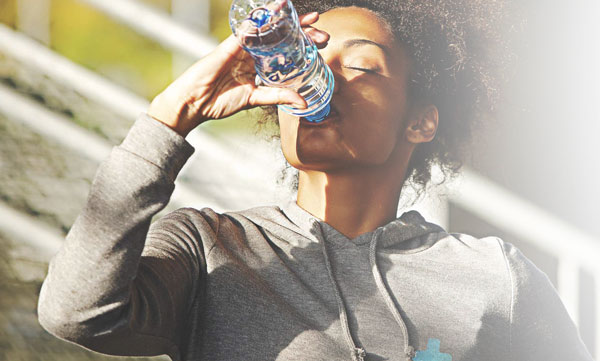

Signs and Symptoms of Dehydration
Dehydration symptoms can vary from one person to another but one of the first signs you are dehydrated is thirst, the onset of which signifies we are already up to 2% dehydrated. An important consideration as we age is that as we approach 50 years of age, the thirst sensation will diminish, and continue to diminish, so as we get older we can rely on this sign less and less and therefore need to be far more proactive in hydration strategies
As we push towards a 5% decrease in hydration and beyond you can start to experience the following symptoms of dehydration:
- Headaches
- Fatigue
- Appetite Loss
- Dizziness
- Confusion
- Discomfort
- Muscle Cramps
- Increased Thirst
- Loss of Focus
- Reduced Urine Output
- Seizures (in Extreme Cases)

Effects on Athletes and Physical Performance when Dehydrated
Being aware of the symptoms of dehydration is therefore essential for ensuring that steps to rectify can be taken swiftly.
As an athlete or a physically active individual dehydration can cause significant loss in performance. When you are not properly hydrated your total body water volume is low which means there’s less blood available for circulation and less fluid available to muscles and body tissue.
As your blood is responsible for the delivery of oxygen and nutrients to your tissues when there’s less blood available for circulation, this delivery to working muscles is diminished.
As the body is an amazingly efficient machine it knows that it needs to keep the vital organs, the brain, heart and lungs for example, hydrated above everything else. So as we become increasingly dehydrated if not rehydrated quickly it starts removing fluid from other parts of the body to keep these vital organs sufficiently hydrated.
As fluids are removed from muscles, joints and other tissues all these cease to work efficiently and create problems including reduced performance and injury.
Being well hydrated means everything can smoothly operate, allowing nerves to properly slide through muscles, skin to slide over bone and other tissues to slide past each other. A dehydrated body is one of the factors that restricts the movement and in a way glue these tissues together, limiting proper movement of muscles and joints.

Blood Volume when Dehydrated
Among other symptoms of dehydration, one of the most important is a reduced blood volume. Blood is responsible not only for delivery of oxygen and nutrients as mentioned above but also for the removal of wastes.
Low blood volume diminishes the body’s ability to remove wastes such as lactic acid produced from the aerobic metabolic process during exercise or increased activity.
Reducing the body’s efficiency in removing these wastes such as lactic acid decreases an athletes lactic threshold therefore reducing the physical performance of an athlete.
When we are well hydrated the blood volume that accepts this lactic acid leaving the muscles is larger and more resistant to pH change, in common parlance, “the solution to pollution is dilution.”
The body sweats in order to dissipate heat from an exercising body. This sweat mechanism is the most efficient way for the body to regulate temperature and not overheat.
When we sweat we lose body fluid, reducing blood volume further. In order to continue to sweat and regulate body temperature we must replace fluids to maintain hydration which leads to increase blood volume and the continued capacity to reduce body temperature.
Use SOS Hydration booster for the ultimate hydration kick
It is not just athletes that may have an increase in fluid loss which could lead to being dehydrated, any person in the right circumstances such as hot or humid conditions can suffer from dehydration. Regardless of the cause or if you are an athlete or not, we can be certain that being dehydrated will result in negative performance outcomes and reduced mental function.
When you’re dehydrated, you’ve lost electrolytes as well as fluids. That’s why water alone isn’t always enough, and that’s where SOS Hydration comes in. SOS provides the perfect balance of electrolytes, fluid and a low amount of sugar to get you hydrated and feeling great again. Please view our other information pages to find more information on What is Dehydration, What are Electrolytes and Electrolyte Imbalance. Or for more information on SOS Hydration specifically visit our Science and Benefits pages.
Sources – Advanced Sports Nutrition – Dan Benardot, Ready to Run – Kelly Starrett


